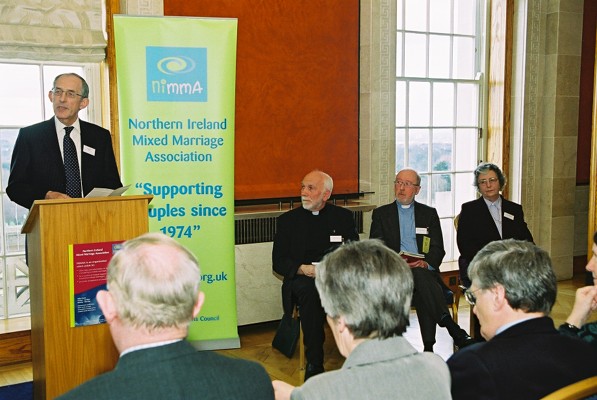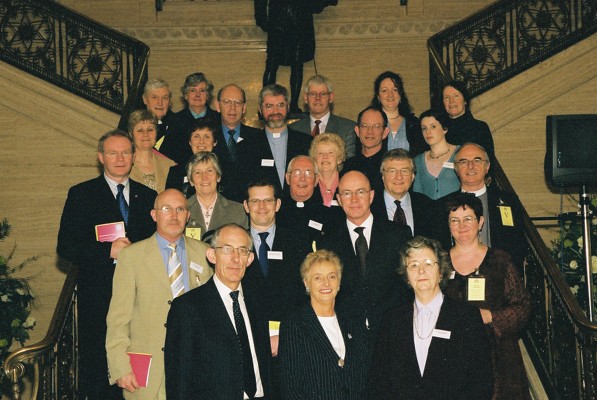"Supporting couples who are united in love across traditional Christian divisions and promoting acceptance of these relationships within Northern Ireland society"

Celebrating the work ... evaluating the impact
At the launch of “Celebrating the Work– Evaluating the Impact” the then Lord Mayor of Belfast, Naomi Long, described the report as “a valuable piece of social history which, while documenting the past, lays down guidelines for the future”. She added “This project encapsulates more than 30 years’ of NIMMA’s work in this area and captures the emotions, hopes and fears, as well as the personal and, often, moving stories of couples involved.“ It also makes recommendations that can and will make life easier for those in mixed marriages and sets out guidelines for the way forward to a truly shared future.”
The report was produced with the support of the Anchor Foundation and made possible by American academic Jayme Reeves. View the extracts and obtain your copy by contacting us.
- Marriage
- Sectarianism
- Inter-communion

There is some thought that the practice of intermarriage between ethnic or religious communities can have social benefits that contribute to the communal common good. Members of NIMMA have noted that intermarriage provides “an o p p o r t u n i t y f o r m o r e understanding of the position of the other, and therefore less blind hatred, and perhaps a loss of fear of each other.” Other advocates of intermarriage have stated similar ideas, noting that if there is a lack of “genuinely close personal relationships and the achievement of at least a measure of institutionalized solidarity is understanding and tension are inevitable”. Furthermore, there is also the understanding that children of these intermarriages have an advantage as they are able to move in and out of both communities, exhibiting “doublebelonging” and contributing to a long-term “lessening of the t e n s i o n b e t w e e n t h e communities” as they grow up and begin to contribute to society outside the family circle.
Northern Ireland is rife with sectarianism. There are pockets where one can get away from it and pretend it does not exist, but those pockets are limited to those who are of the social class who can afford it. For the average working-class person, where it is safe to live, what can be said and what should be kept to one’s self, where one’s taxi driver is comfortable going, and from what community one’s friends are dictate daily life. There is separation even in death: in Belfast City Cemetery there is an underground wall that purposefully separates the Catholic and Protestant dead…
Inevitably, a person is asked where he/she is from, perhaps because there is some indication that he/she does not readily fit into what is considered “normal”. The person replies : “I am from Palestine.” “Right,” says the questioner, usually with a slight pause. “So, are you Protestant or Catholic?” ...
By the 1980s … inter-communion on the larger scale in church as well as Eucharistic sharing on an individual scale between mixed tradition couples were becoming relevant issues to the average congregant. Changes occurred as people began attending each other’s weddings and funerals and NIMMA was there as the changes took place. Among Protestant circles,Eucharistic sharing for such couples was encouraged. Within the Roman Catholic Church the issue was ignored or attempts were made to stop the practice. For those priests who supported eucharistic sharing, rebellion ensued in a quiet way. Believing that pastoral care of the couples overrode authority
Marriage
In the first half of the 20th century, there were cases in Ireland where the non-Catholic spouse was brought to trial and convicted for not keeping the ‘promises’ and therefore guilty of neglecting one’s children and conversion was considered to be the easier route when choosing to marry someone of a different tradition Thankfully, the requirements regarding the promises were relaxed substantially in 1970 with the passage ofMatrimonia Mixta requiring the Catholic partner to only do what was in one’s power to do, within the marriage, to raising one’s children as Catholic. Intentionally vague, the ruling allowed for flexibility of interpretation that was of benefit to mixed marriage couples. However, it took another thirteen years (1983) before it became enacted and enforced by authorities within the Irish Roman Catholic Church.
 Baptism
Baptism
While the ability to get married has become easier over the years, the issue of baptisms has become more difficult. As couples no longer convert in order to be a single-tradition family, the desire to baptise their children into both traditions is a natural consequence. In the early days, ecumenical or joint baptisms that were concelebrated were done in much greater frequency. However, in the last 15-20 years the ability to baptize one’s children in this manner has become more difficult as church authorities have frowned upon joint baptisms….



 Baptism
Baptism